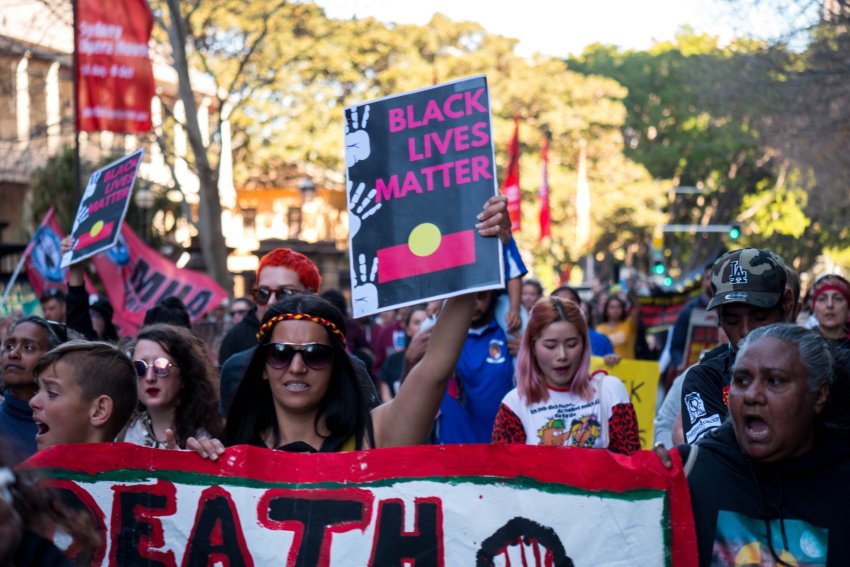
Key recommendations of the Royal Commission into Aboriginal Deaths in Custody assert that in dealing with First Nations peoples, the criminal justice system should apply both arrest and imprisonment as sanctions of “last resort”. Sparked by suspicious deaths like that of 16-year-old John Pat in 1983, the inquiry made 339 such recommendations, most of which have since been ignored.
The commission’s final report was tabled in 1991. At the time, 14% of adult prisoners in Australia were Indigenous. Today, almost three decades on, that figure has doubled to 28%. This is despite First Nations people making up less than 3% of the population.
And it is not only the First Nations incarceration rate that is on a steep incline — deaths in custody continue unabated.
Since the commission, more than 400 First Nations people have died while being detained by an imposed settler colonial system. Recent coronial inquiries have shown that systemic racism pervades both police and corrective services cultures, leading to incidents of unwarranted brutality or complete neglect that are resulting in Black deaths.
Restrained in fatal position
“They took his life as well, when they took the biscuits. They took it with great force,” Leetona Dungay explained in February. She was referring to her son David Dungay Jr, who died in the hospital ward of Long Bay jail in December 2015 while being restrained by six prison guards.
The Dunghutti elder told Sydney Criminal Lawyers she believes corrective services officers bashed her son, during an eight-minute period, when the guards and David were out of range of CCTV cameras. This, she said, is what they refer to as “blind kill”.
During the inquest into Dungay’s death, which ended in March, the NSW Coroner’s Court saw footage of his final moments that shows six corrective services officers holding him down on a bed in the prone position. It has been well documented that this facedown position can prove fatal when a person is restrained in this way.
While Dungay called out 12 times that he could not breathe, an officer told him if he could talk, he was breathing. Then a nurse injected him with a sedative, and he was dead.
Prison guards initially stormed the cell to restrain David, a diabetic, because he would not stop eating a packet of biscuits.
Corrective Services NSW apologised for his death in March, citing “organisational failures”. The coronial findings will be released later this month.
Shackled while on life support
Eric Whittaker died in Westmead Hospital on July 4, 2017. At the time of his passing, he was on a breathing support apparatus and had been unresponsive for days. When Whittaker’s family first entered the hospital room, they found their loved one unconscious and shackled to the bed.
Why the 35-year-old Gamilaraay man’s ankles were chained while he was in an induced coma is something of a mystery. As is why a prison officer disregarded the 20 distress calls Eric made over the cell intercom as he suffered a brain aneurysm.
Corrective Services NSW officer James Dobry admitted to the coronial inquiry in mid-October that Eric’s distress calls were “serious enough to demand a second welfare check”. This is despite the fact he told another officer on duty at the time not to worry about Whittaker’s calls, as he was “a spinner”.
Indigenous Social Justice Association (ISJA) secretary Raul Bassi claims Whittaker was being kept on life support and chained to the bed “to keep his organs alive for when the family came in to ask for them”.
Left to die
Then-acting NSW coroner Teresa O’Sullivan recommended in July that NSW Police update its training for officers in regards to detaining intoxicated persons. She made the remarks in reference to the coronial inquiry into the death of Rebecca Maher at Maitland Police Station.
Maher was found dead in a cell on July 19, 2016. She was heavily intoxicated when locked up. The inquiry found that on-duty officers failed to follow procedures, including correctly performing cell checks or conducting a pat down search – both avoided out of a misguided fear of catching AIDS.
Justice Aunties founding director Tracey Hanshaw maintains it was a failure of duty of care. “She did not need to die that night,” the Awabakal elder said. “Had they followed their own policies and procedures, she’d be alive today.”
Hanshaw added that, from what she heard during the inquest, the 36-year-old Wiradjuri woman could have died hours before it was noticed she was not breathing at 5.52 am that day. Indeed, some officers had shown concern about whether she was breathing much earlier on.
Accountability
Murri activist Ken Canning told those gathered at NSW parliament on October 22: “In 231 years of occupation, not one prison or police officer has been found guilty of the death of an Aboriginal person”. That’s “a really stark statistic”, he added.
Supporters of Fighting in Resistance Equally (FIRE) and ISJA, which led the Black Deaths in Custody (BDIC) campaign, gathered in the Jubilee room of state parliament that day as family members who have lost someone in custody-related circumstances told their stories to parliamentarians.
Along with Dungay, Whittaker and Maher, others who unnecessarily died while being detained were also remembered. The last moments of TJ Hickey, Tane Chatfield, Patrick Fisher, Nathan Reynolds and Mark Mason were shared.
BDIC delivered a declaration to parliament last May with five recommendations aimed at bringing a halt to First Nations deaths in custody. These include holding police and guards to account, releasing those convicted of non-violent crimes and ending the disproportionate number of Indigenous remandees.
“By this parliament making these changes,” the declaration concludes, “the state will not be forced to bear the brunt of possible future class actions.”
[Paul Gregoire is a Sydney-based journalist and writer for Sydney Criminal Lawyers.]